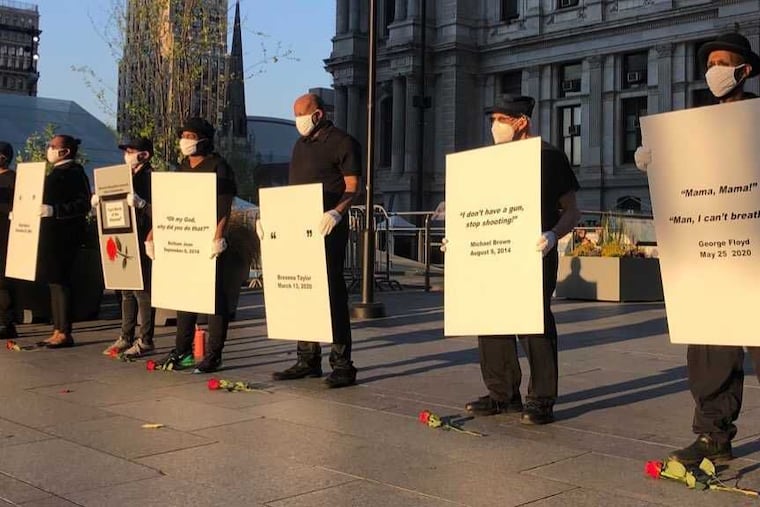Derek Chauvin was held accountable for killing George Floyd. Can that verdict happen in Pa.? | Editorial
The state Supreme Court will weigh in on whether Pennsylvania law gives officers a license to kill fleeing suspects.

After 10 hours of deliberation, a jury found former Minneapolis police officer Derek Chauvin guilty of three counts related to the murder of George Floyd. Despite a vivid video of the crime, the guilty verdict was far from a given. There is a long list of police officers who have killed unarmed Black people, but the list of those charged with a crime is smaller — and only a handful have ever been convicted.
The minimum level of accountability has been served in Minneapolis. Is that an aberration, due to a uniquely cruel death caught on camera, or is the dam of police officer impunity finally showing cracks?
» READ MORE: Looking into Derek Chauvin’s eyes as he was convicted of George Floyd’s murder | Solomon Jones
Philadelphia might find out soon. On the day of the verdict, the state Supreme Court agreed to hear arguments on a problematic law that protects police officers’ use of deadly force.
On June 8, 2017, then-Philadelphia Police Officer Ryan Pownall shot and killed David Jones in North Philadelphia. The 30-year-old Black man had a gun on him, which fell while he was running away. Pownall shot Jones twice in the back — a killing that was caught by a security camera.
Pownall, who shot another fleeing Black man in the back in 2010 and between 2013 and 2017 had 30 allegations of misconduct filed against him, was charged with homicide by District Attorney Larry Krasner in September 2018 — the first time a Philadelphia police officer was charged for an on-duty shooting in two decades.
But nearly 2½ years later, Pownall has not yet faced trial.
The delay stems from a disagreement over jury instructions pertaining to the law that governs police officers’ use of force. The first part of the law is straightforward: Police officers are justified in the use of deadly force when they believe it is “necessary to prevent death or serious bodily injury to himself or another.”
» READ MORE: Three years after a fatal police shooting in Philadelphia, glimpses of change
If the law ended there, the trial would have centered on the question of whether Pownall was in danger. But it doesn’t.
The law goes on to seemingly say that an officer can use deadly force when a suspect is escaping and possesses a deadly weapon. If that’s the case, that means Pennsylvania allows officers to shoot and kill anyone who is escaping if they are carrying a gun, a knife, or even a screwdriver — all potentially deadly weapons.
That gives police a license to kill, and it’s unconstitutional.
In 1985, the Supreme Court of the United States held in Tennessee v. Garner that police officers are justified in using deadly force against a fleeing suspect only when the officer has probable cause to believe that the suspect possesses a “significant threat of death or serious physical injury.”
Knowing this, the District Attorney’s Office asked the judge in the Pownall case to instruct the jury to think of the Pennsylvania law as whole: that a police officer is justified in shooting someone who is escaping when they have a deadly weapon and pose a danger.
After the judge rejected this, the DA’s Office appealed. Now the argument will go before the state Supreme Court.
If the Supreme Court decides to clarify when an officer is justified in using deadly force, that could have a massive impact on Pennsylvania, opening the door to hold more police officers accountable.
» READ MORE: Disarm Philly’s police union from the weapon of secret arbitration | Editorial
Though, Pennsylvania doesn’t have to wait for — or risk — a court ruling. In 2019, State Rep. Summer Lee, Democrat from Allegheny, introduced a bill to clarify the law by making use of deadly force justifiable only to prevent an imminent threat. Lee introduced the bill after an East Pittsburgh police officer was acquitted of the murder of 17-year-old Antwon Rose II. Rose, like Jones, was shot in the back. Rose, like Jones, did not have a gun on him at the moment police shot him, although there were two guns in his vehicle.
Derek Chauvin was found guilty in a court of law after being afforded due process. Every defendant — police officer or otherwise — deserves the same. For the verdict of the Chauvin case to be meaningful in Pennsylvania, the Supreme Court and state legislature should make it clear that use of deadly force by police has clear limits.